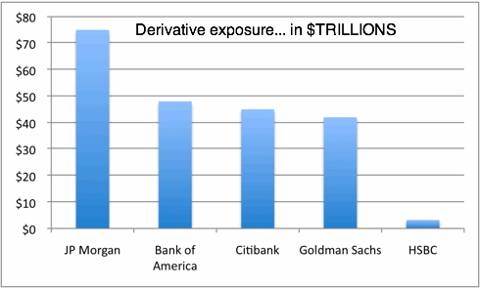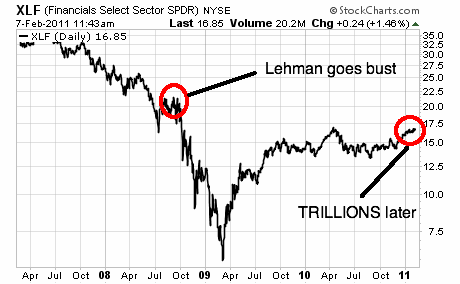Spain Moves to Save Bank, not to Help the People
May 8, 2012
The Spanish government finds it logical to cut expenditures directed to help the ailing economy while spending $13 billion on Bankia.
AFP | MAY 8, 2012
Spain will swoop in with public money this week to clean up huge bad loans at the nation’s fourth-biggest listed bank, Bankia, the government said Monday.
As news emerged of the impending rescue of Bankia, created in 2010 from a merger of seven savings banks, its executive chairman Rodrigo Rato announced his resignation.
Shares in the bank, which has the industry’s largest exposure to the property market at 37.5 billion euros ($49 billion), closed down 3.26 percent at 2.375 euros on a day which saw Spain’s main share index rise 2.72 percent.
Spain’s banks are still struggling to emerge from a 2008 property bubble collapse, which eliminated millions of jobs and left the financial sector buried in risky assets.
Investors fear the unknown cost of rescuing the industry could derail efforts to stem a rapid rise in Spain’s sovereign debt and avert a bail-out.
“We are finalising a plan to clean up the bank,” said an economy ministry official, referring to Bankia, adding that the scheme would use public money and was likely to be announced by Friday.
The state was considering using contingent convertible bonds, he said. These bonds convert into equity in certain circumstances, for example if a bank’s core capital falls below a set ratio.
The leading daily El Pais estimated Bankia would need 5-10 billion euros ($6.5-13 billion) to repair its balance sheet. Business daily Expansion put the figure at 5-7 billion euros.
Those reports were “not far off track”, said the official, declining however to give any figure.
The bank’s chairman said in a statement he would leave its future in other hands.
“I have decided to pass the baton to a new manager to decide what is best for this entity,” said Rato, who was Spanish economy minister from 1996-2004 and managing director of the IMF until 2007.
Rato said he would propose the former chief executive of Spain’s second-largest bank BBVA, Jose Ignacio Goirigolzarri, as his replacement.
Prime Minister Mariano Rajoy’s conservative government, which swept to power in December, had previously refused to countenance the use of public money to rescue the banks.
Rajoy had already ordered Spanish banks to set aside 54 billion euros in provisions against property-related assets.
But the prime minister said Monday that he would use public money if necessary to avoid a systemic collapse.
“If it were necessary to prompt lending, to save the Spanish financial system, I would not decline to do as all the countries in the European Union have done and inject public money,” he told Onda Cero radio.
“But that would be a last resort.”
The premier said new legislation would be announced on Friday to help banks deal with their assets.
But the Spanish leader said he was “not in favour of a bad bank”, an entity that would regroup bad assets and shift their risk away from commercial banks to the government.
He insisted that if any more public money had to go into the banks, it would not compromise the government’s tough deficit targets.
“Public money will only be used in an extreme situation… this will not affect the public deficit,” he said.
Rajoy is under pressure from eurozone neighbours and financial markets to lower Spain’s deficit from 8.5 percent of gross domestic product last year to 5.3 percent this year and 3.0 percent in 2013.
The International Monetary Fund last month urged Spain to push further ahead with banking reforms.
Clearly targeting Bankia, the IMF said in a report: “To preserve financial stability, it is critical that these banks, especially the largest one, take swift and decisive measures to strengthen their balance sheets and improve management and governance practices.”
The Bank of Spain said the banks’ doubtful loans in February amounted to 143.8 billion euros ($188 billion), rising to 8.15 percent of total credits — the highest ratio since 1994.


